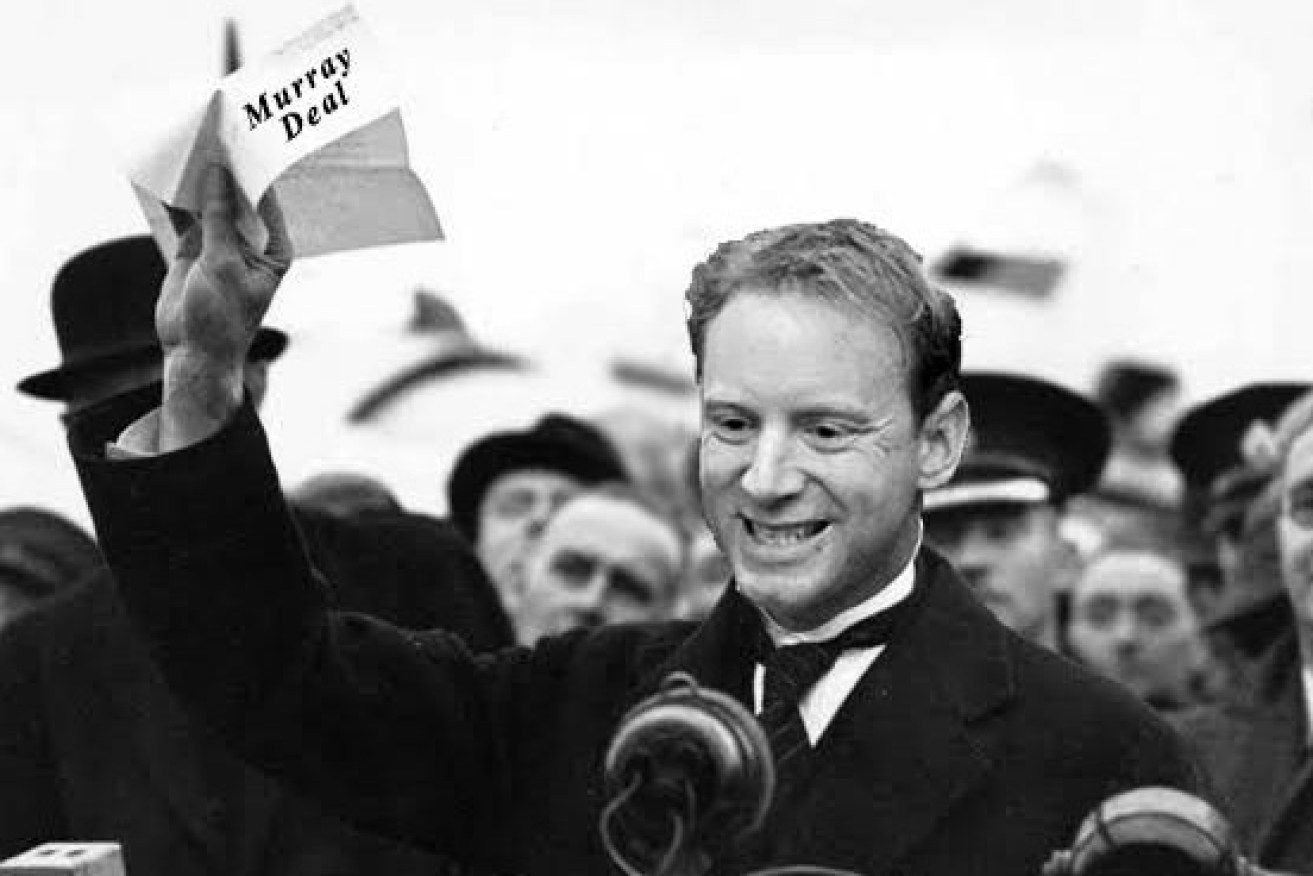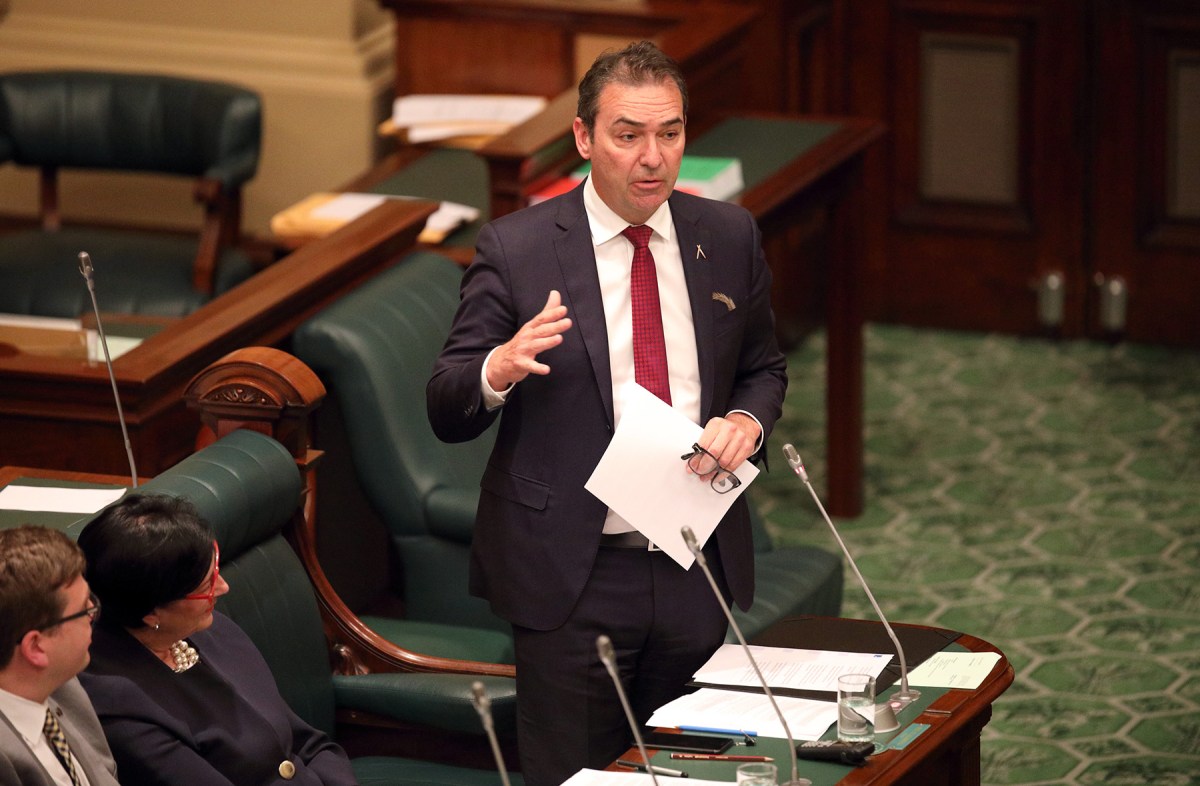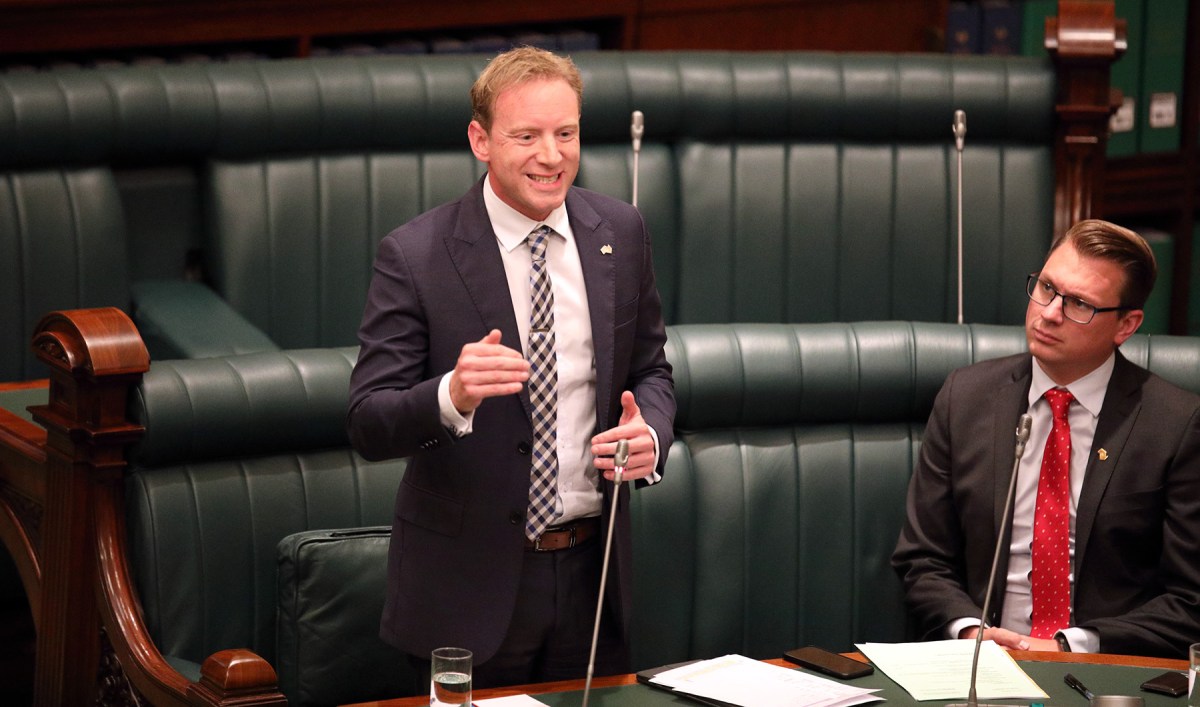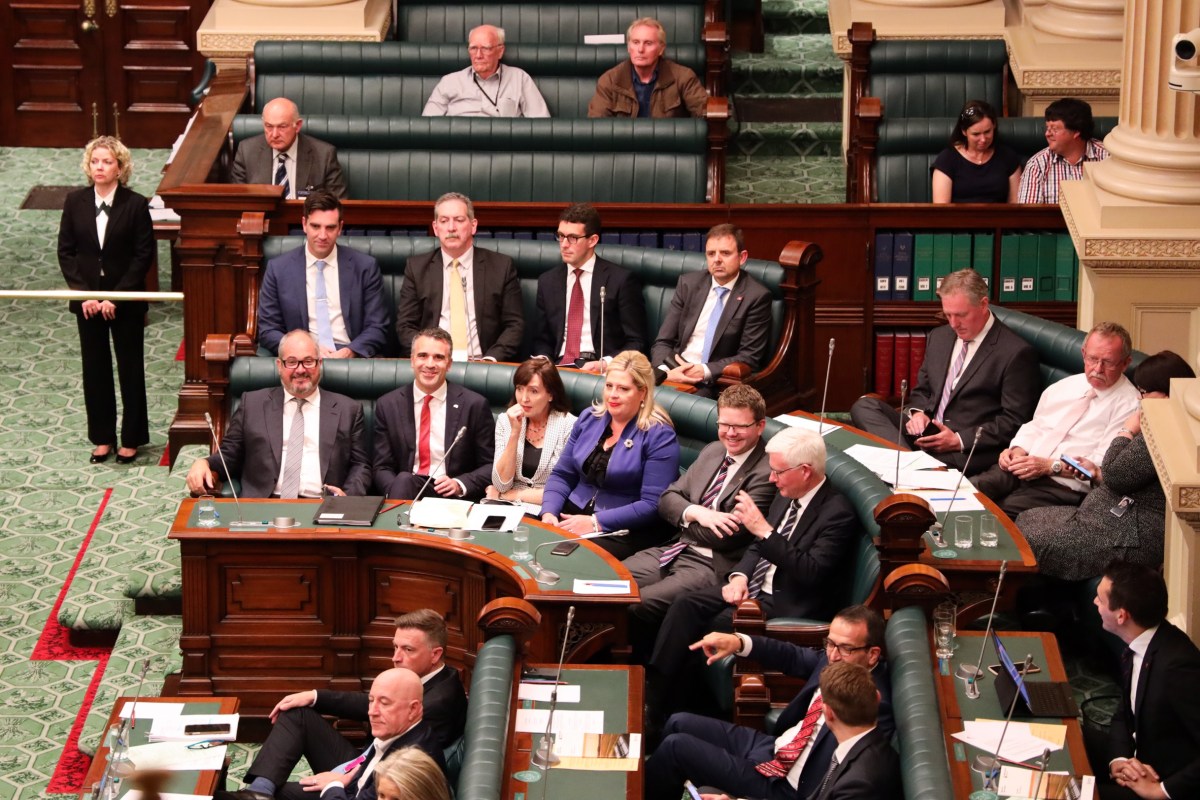Fleeced in our time? The Marshall Govt’s political waterfight
There are plenty of reasons for South Australians to be concerned about the Marshall Government’s response to the Murray Darling Basin Royal Commission, writes Tom Richardson – and they’re not all about David Speirs.

David "Neville" Speirs? Digital image: Paige Mewett
It’s worth going all the way back to the first media conference the Marshall Government held after it released the Murray Darling Basin Royal Commission report to the media, because there was a subtle but notable moment of tension between the Premier and his (now officially ‘embattled’) Water Minister David Speirs.
For context, the gathered media had been given half an hour to get to grips with the report’s 746 pages before Steven Marshall, Speirs and Attorney-General Vickie Chapman – who had been engaged in a public slanging match with Commissioner Bret Walker over the amount of money his inquiry was costing South Australian taxpayers – fronted up for questions. No electronic version was made available until the report was posted online sometime later, so there was no hope of searching for keywords or phrases; reporters had to sift through the A4 brick in front of them, garner what they could in the allotted time and then do their best to ask pertinent questions.
It was no surprise that Walker’s report came down hard on the Basin Plan and the river system’s governance in general.
It’s been long understood to be a basket case – which was kinda why we had a royal commission in the first place.
A bigger surprise was that he would single out the fledgling SA Water Minister for pointed criticism, in terms probably now familiar to most readers.
To recap, the “seven sentences in a report of 746 pages [that] have given opponents of the government their seven seconds of political sunshine” – as Marshall himself couched it this week – slammed Speirs for agreeing to new criteria proposed by the upstream states for the delivery of an agreed extra 450GL of environmental flows by 2024.
The revised terms would mean efficiency measures could only be imposed if they could be shown to “support regional economies” and not reduce the “overall productive capacity of the relevant region”, or “impact negatively on regional jobs”.
The SA Government’s agreement, Royal Commissioner Bret Walker wrote, were not merely “ill-advised”, but “a capitulation to the interests of the current Commonwealth Government, and those of Victoria and New South Wales”.
“It is so contrary to the interests of South Australians that the decision by the Minister responsible is almost certainly a breach of… the South Australian Ministerial Code of Conduct, in that no Minister acting reasonably could consider these changes to the criteria to be anything but totally antipathetic to the interests of South Australia, and the South Australian environment.
“South Australia’s agreement to these changes,” he concluded, “should be immediately reversed.”
It’s worth briefly recapping the Government’s increasingly strident responses to this dressing down.
Marshall initially played down the scathing assessment. “I would point out there was no finding or recommendation against the minister in that area, it was more a commentary,” he told the media.
“I don’t accept that commentary – I think the minster’s done an excellent job negotiating with the Commonwealth.”
Well, alrighty then.

Steven Marshall “doesn’t accept the commentary”. Photo: Tony Lewis / InDaily
Except that it’s completely wrong: Walker’s withering critique is also embedded in the report’s key findings and formal recommendations (pages 62 and 73 respectively).
Still, the Government can respectfully disagree – or disrespectfully, as was the case as the days wore on.
Now, I’m not discounting the genuine possibility that the Government actually believes it got a great deal for SA by signing up to the upstream states’ demands on the efficiency criteria, which also netted a cool $70 million for the Coorong.
Some naysayers might argue that water is better than cash but, after all, Speirs’ own department is transitioning to become primarily an “economic development agency”.
Still, one might think that when one of the nation’s most eminent lawyers spends a year analysing the situation and then advises you to urgently rethink your decision, it would at least give you pause for reflection.
Hell, no. Instead the Libs doubled down; Marshall claimed the compromise as his own, and MPs lined up to pat Speirs on the proverbial back.
They also cannily ensured the issue would go away quietly by calling on a two-day parliamentary debate in which key Government figures singled out Walker for abuse, helpfully reminding everyone that the Commissioner was Not A Deity, and declaring his thoughts on Speirs “ludicrous and nonsensical”.
Speirs himself argued that because the Commissioner and his counsel assisting, Richard Beasley, had repeatedly talked down the prospect of the 450GL being delivered in the first place, he was entitled to throw out the traditional playbook in dealings with the upstream states.
What this ignores, however, is that the Commission’s despondency about the prospect of extra environmental flows stems from the political intractability of constraints upstream, practices and structures such as the Barmah Choke that are a matter for the Commonwealth Government – not Marshall – to navigate.
“Without the removal of constraints, enhancement of the environmental outcomes… is unlikely to be achieved, or at least fully achieved,” Walker notes in his key findings.
“This risks the waste of public funds on efficiency measures.”
The commissioner strongly favours “recovering water for the environment through ‘buybacks’” as a “considerably less expensive” remedy than irrigation efficiency measures for which, he argues, we “would need compelling reasons to justify the additional public expense”.
“There are none,” he adds pointedly.
But more on that later.
Beyond the inherent politicking in all this, it’s worth noting that the Government has this week already tacitly rejected one of Walker’s recommendations – to renegotiate the December efficiency criteria agreement. One of the few recommendations, indeed, that it’s within the SA Government’s purview to act on.
What we don’t know is whether they’re doing so because they genuinely think they’ve done the right thing (as opposed to selling our state up the river) or simply to avoid admitting they made a mistake.
After all, no-one likes to admit they’re wrong, do they? It’s worth recalling that the former Marshall Opposition used to chide Jay Weatherill relentlessly for his impressive collection of mea culpas. But had the Liberal Government taken a different tack, acknowledged that a royal commission had taken serious issue with a recent decision and resolved to reflect on its position, at the very least the political storm might have blown over by now.
So let’s say the Government’s convinced in the rightness of its cause, that it cannily convinced the historically intransigent NSW and Victoria to stay at the table by ceding some political and environmental ground.
Well then, it becomes a simple ‘he said-she said’ equation.
And people can decide whose nous to put more faith in.
A second term 34-year-old MP with two years’ frontbench experience who graduated from uni around the time Steven Marshall was preselected for his seat of Norwood, before cutting his teeth as a mid-level bureaucrat and Marion councillor, and who was literally preaching a completely different policy position on the criteria for delivering environmental flows as recently as October.
Or a Senior Counsel who was admitted to the bar in 1979 and has been President of the NSW Bar Association, President of the Law Council of Australia, Chairman of the Legal Services Council National Criminal Law Liaison Committee, Governor of the Law Foundation of NSW and the first Independent National Security Legislation Monitor.
But who is, of course, Not God.
Still, Marshall made it very clear that his Government would take time to consider Walker’s recommendations and formally respond.
But, from the get-go, he has already effectively rejected that one – and many more besides.
Largely forgotten from that first media conference was Marshall’s response to a question about Walker’s insistence on the importance of water buybacks.
A fundamental recommendation of the report is that “future water recovery for the environment, including the 450 GL, should be purchased through buyback”.
This, Walker noted, would require the repeal of the existing 1500GL cap on buybacks in the Water Act – a move endorsed this week by federal Labor.
But asked about buybacks at that initial media conference last month, Marshall was dismissive.
“We think the irrigators in SA have already done the hard work to make themselves as efficient as possible, and having forced buybacks doesn’t sit well with me or this Government,” he shot back.
Less obvious was Speirs’ more amenable response later in the piece.
“Buybacks have been something states and territories have participated in in the past – SA irrigators and farmers have been part of buybacks in the past and there’s obviously a bucket of money that sits federally that does enable buybacks to occur potentially in the future,” he began.
“However there are many regional communities that are concerned about buybacks because they have a particular economic and social impact…
“SA has been through that – we have transitioned the Riverland to a more efficient model and it’s worked for us to date.
“Buybacks are something that should always be considered when it comes to returning water to the river and I certainly wouldn’t rule them out.”
Curiouser and curiouser.
SA has been historically screwed over by dodgy dealings and political prejudice – if that isn’t worth a fight, what is?
And curiouser still as the rhetoric ramped up over the past frenetic week in state parliament.
Marshall kicked things off with his barnstorming – but carefully scripted – opening gambit on Tuesday, in which he attacked not merely the Commissioner but also the federal Opposition’s stance on abolishing the cap on buybacks.
“It would be very interesting to know from the Leader of the Opposition this week whether or not he supports compulsory water buybacks in SA,” he thundered.
“I know that we are not interested in compulsory water buybacks in South Australia that damage our local communities and would devastate our river communities, who have already done so much of the heavy lifting in this area.
“This sort of recommendation doesn’t sit well with us.”
Has he run this view past his Environment Minister?

David Speirs has had a fortnight to forget. Photo: Tony Lewis / InDaily
In any case, Marshall’s rhetoric is misleading, and given that he’s repeated it on various occasions one must presume deliberately so.
At no point does the Royal Commission advocate “forced” or “compulsory” buybacks. Indeed, Walker’s report explains explicitly that further water for the environment should not be recovered through efficiency measure projects but “through the purchase by the Commonwealth, at an agreed price, of water entitlements (either in full or, usually, in part) from willing vendors” (my italics).
He also argues that – “on the basis of the evidence” – the asserted negative impacts of buyback “either do not exist, or have been greatly overstated”.
Still, try telling that to Marshall’s regional MPs.
The aptly-named Steve Murray, who holds the metro seat of Davenport but hails from Mannum, hit the hustings with a fiery denunciation of the Royal Commission report, advocating on-farm efficiencies over “the wholesale decimation of communities by the application of the Commissioner’s preferred methodology of applying water buybacks”.
Murray continued with a torrent that would be the envy of his namesake: “Shouting demands for upstream buybacks is not going to get the environmental flows we need – it is a proven failure.”
His Riverland compatriot and frontbench colleague, the ironically named Tim Whetstone, continued the assault: “We have seen what the buybacks have done to the river communities – we have seen what they have done to many of the environmental assets that we have, particularly in SA: right across the basin there are dead properties everywhere.”
Speirs, lauded Whetstone, has been “upriver, speaking with the irrigators, with the community, better understanding why buybacks are not the answer [and] why water efficiency programs were the saviour of the Riverland communities”.
Let’s not forget that late last year Marshall was embarrassed by a full-scale mining policy assault from a corps of regional backbenchers that saw four of them (including Murray) cross the floor to vote with the Opposition.
The stark rhetorical gulf between his Water Minister and his regional MPs such as the aptly-named Murray and the ironically-named Whetstone suggest buybacks loom as another issue on which the party may be fundamentally split.

Liberal MPs Fraser Ellis, Steve Murray, Dan Cregan and Nick McBride crossed the floor to vote with Labor on the mining debate.
Crucially, though, on this issue the Premier already appears to have signalled that he’s siding with the regional MPs.
And, thus, against the Royal Commission.
Which means that, already, the Government has signalled an outright rejection of Walker’s most fundamental recommendation.
That’s its prerogative: the concern, though, is that it appears politics has already clouded any prospect of a considered response to Walker’s very considered report.
And frankly, this issue is too important to simply take on trust that there are genuine issues of contention here, as opposed to merely political vested interest.
The prospect that the still-fledgling Marshall Government is locking our state into a policy position that is – according to one of the nation’s best legal minds – at best poor and at worst dangerous, merely to avoid having to admit it got it wrong is an uneasy one to contemplate.
Marshall and his ministers have made much of their desire to avoid “fake fights” with other jurisdictions, and that is laudable, but the River Murray is an issue worth fighting over.
And there are plenty of avenues to do so.
SA has been historically screwed over by dodgy dealings and political prejudice, and if that isn’t worth a fight, what the hell is?
Speirs may have left the December ministerial showdown shouting “peace in our time”, but only time will tell whether appeasement will deliver – as he likes to call it – “real water”.
And time isn’t on our side.
Tom Richardson is a senior reporter at InDaily.




